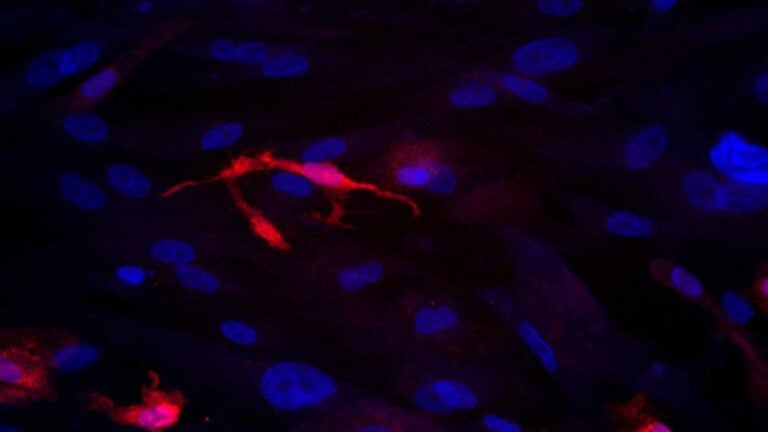
USC scientist ‘reprograms’ roving immune cells in Alzheimer’s research
The novel, less invasive approach produces functional nerve cells for patients
About 15 percent of the cells in our brains are scavengers — roving immune cells known as microglia that remove infectious agents, damaged neurons and plaques.
Because it would be damaging to extract microglia directly from the skulls of Alzheimer’s patients, USC Stem Cell scientist Justin Ichida’s group is taking a far less invasive approach. Using small samples of patients’ blood or skin, the team is applying a technique called “reprogramming” to transform these cells into microglia.
We’ve used this approach to produce functional nerve cells and other cell types, but not microglia, so this will be a first.
Justin Ichida
“We’ve used this approach to produce functional nerve cells and other cell types, but not microglia, so this will be a first,” said Ichida, who also uses reprogramming to study ALS and frontotemporal dementia.
Ichida’s team will then use a gene-editing tool called CRISPR to introduce two genes associated with Alzheimer’s disease into the patient-derived microglia.
The researchers will observe how these two genes alter the function of the microglia. These genetic changes could cause a variety of problems, such as triggering inflammation or preventing microglia from cleaning up defective proteins known as amyloid plaques, which are implicated in Alzheimer’s disease.
In addition to revealing how the two Alzheimer’s-related genes affect the function of microglia, the project will pave the way for other researchers to study microglia on a patient-specific basis.
A positive partnership
Ichida’s team is taking a look at the role of microglia in the onset of Alzheimer’s with support from a $100,000 gift from the John Douglas French Alzheimer’s Foundation.
“Dr. Ichida is a trailblazer, and our foundation has a long-standing commitment to supporting pioneering approaches to both preventing and finding a cure for Alzheimer’s disease,” said Dan Michel, president of the John Douglas French Alzheimer’s Foundation.
Cheryl M. Craft, an international scientific adviser and member of the board of directors at the foundation and a professor of ophthalmology and integrative anatomical sciences at the Keck School of Medicine of USC, added: “By supporting the most creative, cutting-edge researchers, the foundation is accelerating the quest for new treatments for the increasing number of patients suffering from Alzheimer’s dementia.”
As a longtime champion of such innovative research, the John Douglas French Alzheimer’s Foundation has given more than $2.5 million to USC. Its gift to the Ichida Lab honors Michael Minchin, Jr., who passed away while serving as the foundation’s president and CEO.
“I’d like to thank the John Douglas French Alzheimer’s Foundation for its support of my lab’s novel approach to studying Alzheimer’s disease,” said Ichida, assistant professor of stem cell biology and regenerative medicine. “Their partnership enables us to make new strides toward helping the 5.5 million Americans living with this debilitating and often fatal disease.”
